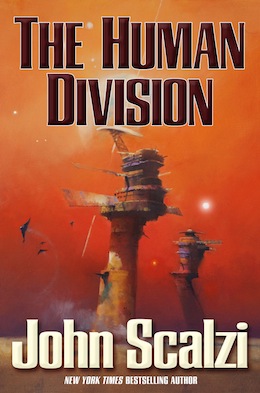This essay, on The Human Division, is the fifth installment in an on-going retrospective of John Scalzi’s Old Man’s War series. Previous installments have covered Old Man’s War, The Ghost Brigades, The Last Colony and Zoe’s Tale. The latest volume in the series, The End of All Things, is currently available from Tor Books.
The Human Division takes place directly after the events of The Last Colony—at a moment when news of the Colonial Union/Earth split (engendered by John Perry and Jane Sagan) is just trickling down to the lower rungs of government and military. Higher up, the powers that be in the Colonial Union are adjusting to the new reality, which is to say, no longer being able to rely on Earth for a steady source of soldiers and colonists.
This, in turn, has major implications for how the Colonial Union conducts itself in the galaxy. In short, it either has to make do with a smaller (and less easily replaceable) pool of soldiers or it has to recruit directly from the colonies. As it happens, the Colonial Union sees conscription of colonists as a no-go—in the fear that they would, as a consequence, rebel at the practice; and in the knowledge that the colonists themselves as not so easily replaceable. So the Colonial Union opts to go lean, and that means having to conduct foreign policy in ways that don’t involve brute force. And that means relying on diplomacy—never the Colonial Union’s strong suit.
Enter Sara Bair, the Colonial Union’s best diplomat, who is en route to a secret rendezvous with the Utche, a previously hostile species with whom the Colonial Union is ready to do business. Only the CDF frigate is attacked and destroyed, leaving the Colonial Union scrambling for a replacement.
That replacement is lower-level diplomat Ode Abumwe, who has negotiated with the Utche before and, though nobody’s first choice, would be a convenient fall guy were the negotiations to collapse. Plus her crew includes CDF officer Harry Wilson, who you will remember as one of John Perry’s closest friends. So there’s someone on board who might be able to locate the lost frigate’s black box and figure out just who staged the attack.
What proceeds from this point is a political mystery told from a variety of perspectives and in a variety of ways. It’s a neat experiment in storytelling—one that tries in some ways to capture the “feel” of a TV season. Does it work? Yes and no.
Overall, there is a lot to recommend here. The central characters—Wilson, Abumwe and Hart Schmidt especially—are strong. The central mystery, meanwhile, is quite compelling. In short, The Human Division is an entertaining return to the Old Man’s War universe. And Scalzi’s writing is, as always, highly engaging.
But remember that this book is structured, like a TV season, into 13 discrete “episodes”—each with their own preoccupations and flavors. Unlike most TV seasons, though, there’s no standard format—far from it. Instead, while some episodes are written in straightforward third-person limited, others experiment with narrative structure (for example one episode that adopts the format of a teleplay). What’s more, some of the third-person limited chapters involve characters or stories that are tangential to the main plot—filling in color or background, primarily.
These experimentations don’t always produce even results, and more than once I found myself getting frustrated when an episode went off on a tangent from the main narrative. Simply put, the episodes that focus on Wilson, Abumwe and the crew of the Clarke are nearly always superior to the ones that don’t, which begs the question of what The Human Division might have been like had it stuck with these central characters, a la Old Man’s War or The Last Colony.
That said, some of the tangential episodes are quite good—so good that it grows difficult to imagine their absence. Episode 6, “The Back Channel,” which stars Conclave #2 Hafte Sorvalh and involves churros, is one example. It’s fun, memorable and could probably even function autonomously as a short story. But in general there are just too many excursions away from the main narrative, with too little payoff.
The Human Division is also, I think, much lighter fare than the previous entries in the series. Certainly all books in this series have been, on the surface, commercial-friendly page-turners, but the original trilogy (plus Zoe’s Tale) used superficial lightness as a delivery mechanism for some fairly heavy themes. There are times when The Human Division suggests it might go in that direction, and at least one point when it decidedly does; but in the end it’s less concerned with that kind of thing. As a matter of taste, I prefer the darkest and/or heaviest entries in this series (i.e. The Ghost Brigades and The Last Colony). But again, that’s a matter of taste. Regardless, this does feel like a lighter and more casual book than its predecessors.
It is a good story, though.
The G is founder and co-editor of the group blog ‘nerds of a feather, flock together’, which covers SF/F and crime fiction, comics, cult films and video games. He moonlights as an academic.










